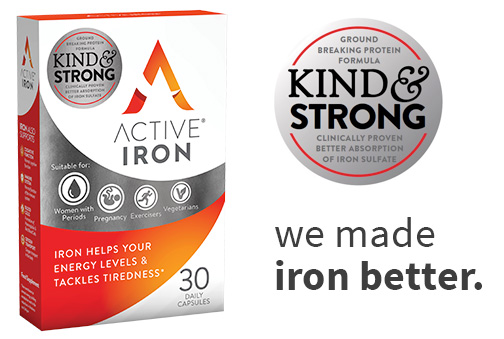Iron-rich foods
for vegetarians
Although a vegetarian diet can be high in iron-rich foods, these plant-based (non-heme) sources of iron are poorly absorbed. This may be coupled with other potential absorption obstacles such as phytates in whole-grains and legumes or tannins in tea and coffee, which can bind iron and further reduce absorption. In the US, RDAs for vegetarians are set at 1.8 times of RDA for non-vegetarians to ensure adequate iron levels.
Vegetarian food sources of iron include lentils, chickpeas, beans, tofu, cashew nuts, chia seeds, ground linseed, hemp seeds, pumpkin seeds, kale, dried apricots and figs, raisins, quinoa and fortified breakfast cereal.

Plant-based iron sources can be iron inhibiting for vegetarians
Some naturally occurring compounds in non-heme iron sources can actually inhibit iron absorption. This means that while the food itself may be high in iron, it may be difficult for your body to use it. Common iron inhibitors found in vegetarian foods include phytates, tannins and polyphenols.
Foods that decrease iron absorption
Phytates are the main inhibitor of iron from plant foods including It is found mostly in legumes and cereal grains. Soaking, sprouting and fermenting these foods can greatly reduce the phytate content and therefore increase iron bioavailability and make it easier for your body to use iron from these sources.
Polyphenols (also called vegetable tannins) are another category of iron inhibitors found in plant foods. They’re found in lots of tasty things like teas, coffee, red wine and cocoa. There are different types of polyphenols with different inhibitory strength, for example, tea polyphenols inhibit iron more vegetable tannins found in coffee or wine ones. Polyphenols are an important antioxidant for the body and should be included in a balanced diet. Current advice is to ensure that you consume coffee or tea at least 30 minutes before or after iron rich foods or iron pills.

Calcium and iron availability
Calcium may affect both haem and non-haem iron absorption. How much of an effect calcium has on iron directly is still up for debate. Calcium is an essential mineral and should be included in the diet. It is advisable to eat foods rich in calcium at a different time to iron rich foods.
The effect of proteins on iron absorption
The protein in soybeans has also been found to inhibit iron. Casein found in milk and egg proteins have also been shown to inhibit non-haem iron. Eggs contain phosphoprotein, a compound with iron-binding capacity that can impair iron absorption. Some studies have shown that one hard-boiled egg can reduce the absorption of iron in a meal by as much as 28%. Ideally, eggs should be eaten at a different time to your iron-rich meal.
Vegetarian iron supplements
Many vegetarians, particularly women with periods, find it difficult to meet their iron needs through diet alone and may benefit from taking an iron supplement if they are unable to replenish their iron stores.
Active Iron is a vegetarian-friendly iron supplement. Active Iron capsules contain a ground-breaking whey protein formula that is free from artificial preservatives, sugar, gluten and wheat.
